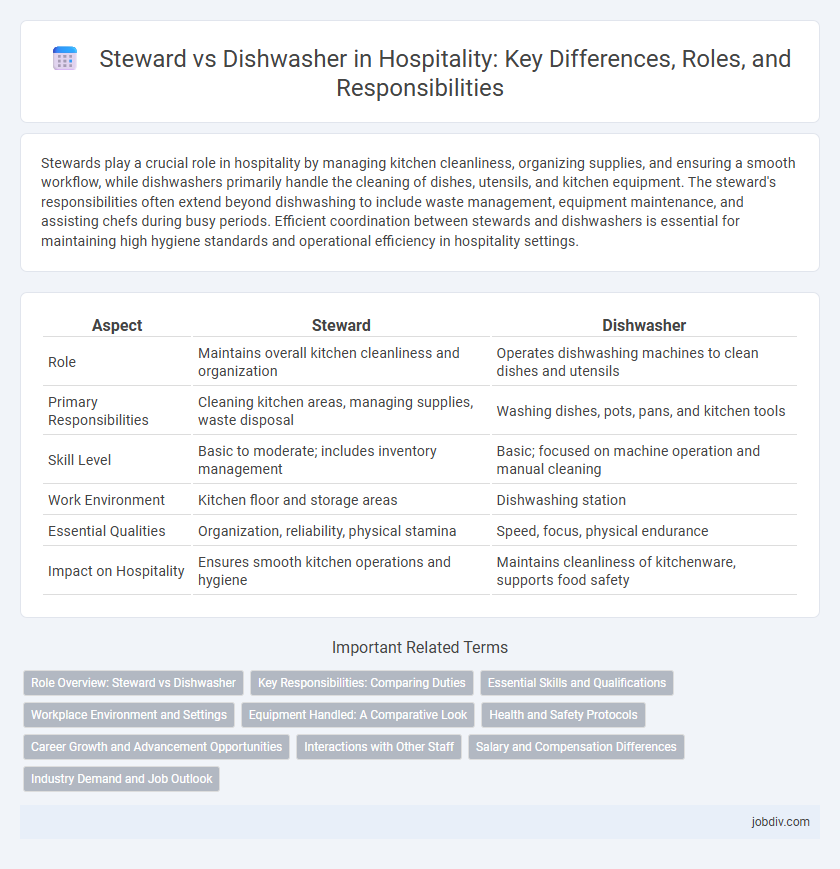Stewards play a crucial role in hospitality by managing kitchen cleanliness, organizing supplies, and ensuring a smooth workflow, while dishwashers primarily handle the cleaning of dishes, utensils, and kitchen equipment. The steward's responsibilities often extend beyond dishwashing to include waste management, equipment maintenance, and assisting chefs during busy periods. Efficient coordination between stewards and dishwashers is essential for maintaining high hygiene standards and operational efficiency in hospitality settings.
Table of Comparison
| Aspect | Steward | Dishwasher |
|---|---|---|
| Role | Maintains overall kitchen cleanliness and organization | Operates dishwashing machines to clean dishes and utensils |
| Primary Responsibilities | Cleaning kitchen areas, managing supplies, waste disposal | Washing dishes, pots, pans, and kitchen tools |
| Skill Level | Basic to moderate; includes inventory management | Basic; focused on machine operation and manual cleaning |
| Work Environment | Kitchen floor and storage areas | Dishwashing station |
| Essential Qualities | Organization, reliability, physical stamina | Speed, focus, physical endurance |
| Impact on Hospitality | Ensures smooth kitchen operations and hygiene | Maintains cleanliness of kitchenware, supports food safety |
Role Overview: Steward vs Dishwasher
The steward in hospitality manages kitchen cleanliness, supplies, and waste disposal, ensuring smooth operations and compliance with health standards. Dishwashers focus on cleaning dishes, utensils, and kitchen equipment efficiently to maintain hygiene and support the kitchen staff. Both roles are essential for maintaining a sanitary environment but differ in scope and responsibility within the kitchen hierarchy.
Key Responsibilities: Comparing Duties
Stewards manage inventory, sanitize kitchen equipment, and maintain cleanliness in dining and food preparation areas, ensuring compliance with health and safety standards. Dishwashers primarily focus on cleaning dishes, utensils, and cookware efficiently to support kitchen operations. Both roles contribute to overall hygiene but stewards hold broader responsibilities that include organizing supplies and assisting in kitchen logistics.
Essential Skills and Qualifications
Stewards in hospitality require strong organizational skills, knowledge of sanitation standards, and the ability to manage kitchen inventory, ensuring smooth operation behind the scenes. Dishwashers must possess attention to detail, physical stamina, and familiarity with industrial cleaning equipment to maintain hygiene and cleanliness efficiently. Both roles demand reliability, teamwork, and adherence to safety protocols to support overall kitchen productivity.
Workplace Environment and Settings
Stewards and dishwashers both operate in fast-paced kitchen environments but differ in scope and responsibilities; stewards often manage overall sanitation, equipment maintenance, and inventory control, fostering a more organized workspace. Dishwashers primarily focus on cleaning dishes and utensils, working in wet, noisy, and confined settings that demand efficient handling of high-volume dishwashing equipment. The steward's role typically requires coordination with kitchen staff and supervisors to ensure smooth operations, while dishwashers mainly execute repetitive cleaning tasks with limited direct interaction.
Equipment Handled: A Comparative Look
Stewards primarily handle a variety of kitchen equipment including pots, pans, knives, and specialized utensils, ensuring they are cleaned, maintained, and organized for efficient kitchen operations. Dishwashers focus mainly on cleaning dishes, glassware, flatware, and basic kitchen utensils using high-capacity dishwashing machines and sanitizing equipment. The steward's role encompasses more comprehensive equipment care and inventory management compared to the dishwasher's concentration on dish cleaning processes.
Health and Safety Protocols
Stewards ensure strict adherence to health and safety protocols by monitoring sanitation practices and managing chemical usage in kitchens, reducing contamination risks. Dishwashers focus on effectively cleaning and sanitizing dishes and utensils at high temperatures to eliminate harmful bacteria and maintain a sterile environment. Both roles are crucial in upholding hygiene standards to prevent foodborne illnesses and ensure guest safety in hospitality settings.
Career Growth and Advancement Opportunities
Steward roles in hospitality often provide broader career growth opportunities than dishwasher positions due to their involvement in inventory management and kitchen organization, enhancing skills valuable for supervisory roles. Dishwashers primarily perform repetitive cleaning tasks with limited exposure to operational processes, resulting in fewer advancement prospects. Transitioning from steward to roles like kitchen supervisor or assistant chef is more common, reflecting the career development potential embedded in stewardship positions.
Interactions with Other Staff
Stewards coordinate closely with kitchen chefs and waitstaff to ensure smooth service flow and maintain cleanliness standards throughout the hospitality environment. Dishwashers primarily interact with kitchen staff, focusing on rapid and efficient cleaning of dishes, utensils, and kitchen equipment to support food preparation. Both roles are essential for operational efficiency but vary in the scope and nature of their communication within the team.
Salary and Compensation Differences
Stewards in hospitality typically earn higher salaries than dishwashers due to broader responsibilities, including inventory management and kitchen maintenance, leading to average annual wages ranging from $25,000 to $35,000 compared to dishwashers' $20,000 to $28,000. Compensation packages for stewards often include benefits such as health insurance and performance bonuses, reflecting their critical role in kitchen operations. Dishwashers may receive lower hourly wages with fewer added benefits, emphasizing the distinct financial disparity rooted in job complexity and skill requirements.
Industry Demand and Job Outlook
The hospitality industry shows strong demand for both stewards and dishwashers, with stewards often preferred for their broader responsibilities including kitchen cleanliness, utensil management, and safety compliance. Dishwashers face steady job outlooks due to the high turnover and essential nature of their role, but advancement opportunities are more limited compared to stewards. Industry trends highlight growing preference for multi-skilled stewards as restaurants and hotels seek efficiency and compliance with health regulations.
Steward vs Dishwasher Infographic

 jobdiv.com
jobdiv.com